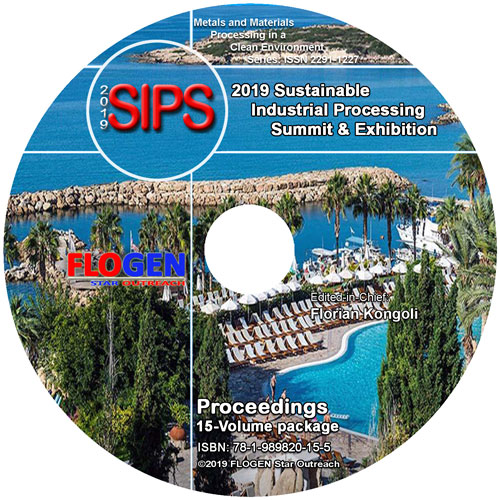2019-Sustainable Industrial Processing Summit
SIPS2019 Volume 10: Vayenas Intl. Symp. / Physical Chemistry and its applications for sustainable development
| Editors: | Vayenas Intl. Symp. / Physical Chemistry and its applications for sustainable development Edited by: F. Kongoli, E. Aifantis, C. Cavalca, A. de Lucas Consuegra, A. Efstathiou, M. Fardis, D. Grigoriou, A. Lemonidou, S.G. Neophytides, Y. Roman, M. Stoukides, M. Sullivan, P. Vernoux, X. Verykios, I. Yentekakis |
| Publisher: | Flogen Star OUTREACH |
| Publication Year: | 2019 |
| Pages: | 249 pages |
| ISBN: | 978-1-989820-09-4 |
| ISSN: | 2291-1227 (Metals and Materials Processing in a Clean Environment Series) |

CD shopping page
Consequences of Important Parameters on the Effect of Water on Fischer-Tropsch Synthesis Rate and Selectivity
Klito C. Petallidou1; Enrique Iglesia2; Angelos Efstathiou3;1UNIVERSITY OF CALIFORNIA AT BERKELEY, UNIVERSITY OF CYPRUS, Nicosia, Cyprus; 2UNIVERSITY OF CALIFORNIA AT BERKELEY, Berkeley, United States; 3UNIVERSITY OF CYPRUS, Nicosia, Cyprus;
Type of Paper: Regular
Id Paper: 195
Topic: 53
Abstract:
Water is one of the main products of Fischer-Tropsch (FT) synthesis and its effect on the FT rate has been reported to be positive [1], negative [2], or negligible [1]. The void structure plays an important role on the effect of water on the FT rate [1]. Catalysts with large void structures show positive effects of water on the turnover rate, while catalysts with small void structure show negligible effects. In the case of small void structures, the condense H2O phase may already exist, while large void structures, require higher water pressure for intrapore condensation [1, 3]. Also, it has been reported that these enhancement rates with increasing water pressure are due to stabilization of kinetically-relevant step through H-transfer [4].
Kinetic and spectroscopic experiments were used to address the influence of the void structure on the effect of water on the rate and selectivity of FT synthesis over Cobalt-based catalysts and the consequences of (i) Cobalt particle size, (ii) extent of reduction of Cobalt, (iii) total pressure of CO/H2 and (iv) reaction temperature. The consequences of these important parameters on the influence of void structure on the effect water remain unanswered until now. The present study provides a useful and important contribution to the state-of-the-art important kinetic and mechanistic aspects of FT synthesis.
These rate enhancements caused by water are independent of the particle size and the extent of reduction of cobalt. Water plays an important role on the reaction temperature and the total pressure of reactants. Catalysts with large void structures show positive effects of water on the turnover rate at lower reaction temperatures and higher pressures, while at higher reaction temperatures and lower pressures minor effects are observed. Catalysts with small void structure show negligible effects of water on the rate in all experimental conditions. In all cases (small and large void structure), CH4 selectivity decreases and C5+ selectivity increases with increasing the water partial pressure, except at higher temperatures and lower pressures, where the selectivities are constant. These results reinforce the previous proposal for intrapore condensation of liquid water.
Keywords:
Heterogeneous catalysis;References:
[1] E. Iglesia, Appl. Catal. A: Gen. 161 (1997) 59-78.[2] A.M. Hilmen, D. Schanke, K.F. Hanssen, A. Holmen, Appl. Catal. A: Gen. 186 (1999) 169-188.
[3] S. Krishnamoorthy, M. Tu, M.P. Ojeda, D. Pinna, E. Iglesia, J. Catal. 211 (2002) 422-433.
[4] D.D. Hibbitts, B.T. Loveless, M. Neurock, E. Iglesia, Angew. Chem. Int. Ed. 20 (2013) 12273-12278.